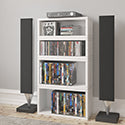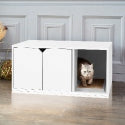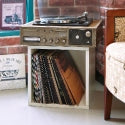Written by: Julie Clifford 
Who Needs a Home Office?
Anyone who has tried to claim a corner of the kitchen table to fill in a tax return, or found themselves pushing aside a teenager’s homework in order to get a seat on the couch, will understand the value of setting aside a corner of the house as a quiet workspace. A properly organized home office can also be a comfortable space that is welcoming enough to be used as a reading room if you have a lot of books, or a relaxing place where you can enjoy your record collection in peace. You might think that once you have set up your desk with a comfortable chair you will be ready to start working from home, sorting out your bills or writing that great novel, but taking a little more care in organizing your home office can ensure that you spend more time working and less time looking for missing files.
Creating a Space
Although the desk and chair are important, the key to creating a good working environment is to be organized. Distraction and procrastination are the main threats to getting your work done, so you need to create a space that will help you stay focused. The ideal option is to set aside a separate room as a workspace, but this will often mean having to make use of one of those small and unusually shaped rooms that are available only because there didn’t seem to be any other way of using them. Organization takes a little more imagination in these rooms. The key is to think about how you can make the most of the space, rather than trying to find ways of cramming conventionally shaped furniture into it. Why should your bookcases have to stop at the lowest end of a sloping ceiling when you can build storage cubes up into an asymmetric shape that uses the whole space? In other cases, the problem may not be the shape of the space, but rather the fact that an office has to be fitted into just one corner of a larger room. Rather than place shelving against the walls, you can shield your workspace by using a bookcase as a room divider, helping to block any distractions.
Knowing Where Everything Is
The best intentions in the world will not keep you working if you can’t find the file that you need, or if the mess on your desk keeps giving you an excuse to procrastinate by tidying up. Including several different types of storage in your office can allow you to keep everything in its own place:
- Use jars or containers to keep small items like paperclips tidy, and storage baskets to hold larger ones like printer ink cartridges
- Storage boxes with closed backs and doors will prevent small items accidentally falling down the back of the unit and conceal any clutter
- Storage cubes can be used to create a filing system or to separate books alphabetically
- Electronic items like wireless routers can be kept on open-backed bookcases so that the cables can pass behind the case, out of sight
Investing in Your Home Office
Setting up a workspace that works can take a lot of organization, but once it is ready you will find that the effort was worth it. You should be able to work without any irritating distractions and anything you need should be easy to locate in its place in the storage cubes and boxes. Many people find that working at home enriches their lives, by cutting their commute and allowing them to spend more time with their families. Such benefits are clearly worth the organizational effort, but it is sensible to remember that you gain new responsibilities as well as the chance to shape your own working environment when you choose to work from home. It can be surprising how much equipment, including expensive electronics and computers, you might need to use in your home office. You may need to consider how you will protect this equipment against accidental damage or breakage, as well as thinking about what equipment you really need before you plan how to organize it all.
A Space for More than Work
If you set up an office that is comfortable and well organized, you will find that it can become much more than a place to work. Nothing inspires reading more than a wall lined with books, so finding a place for a comfortable chair and some cushions can allow you the luxury of having your own private library. If you are hoping that your home office will provide your kids with a space to study, then a reading corner will be particularly useful. Children who are encouraged to read at home are at a big advantage, so setting aside a few storage cubes for kids’ books and providing a storage bench for them to sit on while you read together could be educational as well as enjoyable.













